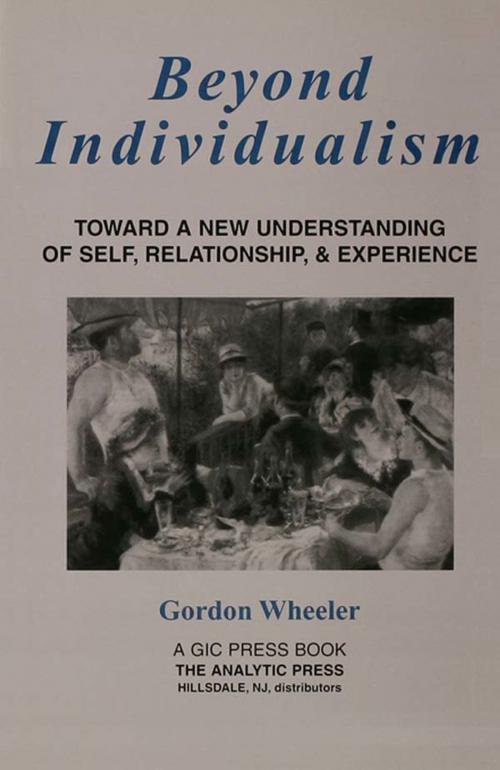Beyond Individualism
Toward a New Understanding of Self, Relationship, and Experience
Nonfiction, Health & Well Being, Psychology, Applied Psychology, Psychotherapy, Interpersonal Relations| Author: | Gordon Wheeler | ISBN: | 9781135061487 |
| Publisher: | Taylor and Francis | Publication: | April 15, 2013 |
| Imprint: | Gestalt Press | Language: | English |
| Author: | Gordon Wheeler |
| ISBN: | 9781135061487 |
| Publisher: | Taylor and Francis |
| Publication: | April 15, 2013 |
| Imprint: | Gestalt Press |
| Language: | English |
In this pathbreaking and provocative new treatment of some of the oldest dilemmas of psychology and relationship, Gordon Wheeler challenges the most basic tenet of the West cultural tradition: the individualist self. Characteristics of this self-model are our embedded yet pervasive ideas that the individual self precedes and transcends relationship and social field conditions and that interpersonal experience is somehow secondary and even opposed to the needs of the inner self. Assumptions like these, Wheeler argues, which are taken to be inherent to human nature and development, amount to a controlling cultural paradigm that does considerable violence to both our evolutionary self-nature and our intuitive self-experience. He asserts that we are actually far more relational and intersubjective than our cultural generally allows and that these relational capacities are deeply built into our inherent evolutionary nature.
His argument progresses from the origins and lineage of the Western individualist self-model, into the basis for a new model of the self, relationship, and experience out of the insights and implications of Gestalt psychology and its philosophical derivatives, deconstructivism and social constructionism. From there, in a linked series of experiential chapters, each of them a groundbreaking essay in its own right, he takes up the essential dynamic themes of self-experience and relational life: interpersonal orientation, meaning-making and adaptation, support, shame, intimacy, and finally narrative and gender, culminating in considerations of health, ethics, politics, and spirit. The result is a picture and an experience of self that is grounded in the active dynamics of attention, problem solving, imagination, interpretation, evaluation, emotion, meaning-making, narration, and, above all, relationship. By the final section, the reader comes away with a new sense of what it means to be human and a new and more usable definition of health.
In this pathbreaking and provocative new treatment of some of the oldest dilemmas of psychology and relationship, Gordon Wheeler challenges the most basic tenet of the West cultural tradition: the individualist self. Characteristics of this self-model are our embedded yet pervasive ideas that the individual self precedes and transcends relationship and social field conditions and that interpersonal experience is somehow secondary and even opposed to the needs of the inner self. Assumptions like these, Wheeler argues, which are taken to be inherent to human nature and development, amount to a controlling cultural paradigm that does considerable violence to both our evolutionary self-nature and our intuitive self-experience. He asserts that we are actually far more relational and intersubjective than our cultural generally allows and that these relational capacities are deeply built into our inherent evolutionary nature.
His argument progresses from the origins and lineage of the Western individualist self-model, into the basis for a new model of the self, relationship, and experience out of the insights and implications of Gestalt psychology and its philosophical derivatives, deconstructivism and social constructionism. From there, in a linked series of experiential chapters, each of them a groundbreaking essay in its own right, he takes up the essential dynamic themes of self-experience and relational life: interpersonal orientation, meaning-making and adaptation, support, shame, intimacy, and finally narrative and gender, culminating in considerations of health, ethics, politics, and spirit. The result is a picture and an experience of self that is grounded in the active dynamics of attention, problem solving, imagination, interpretation, evaluation, emotion, meaning-making, narration, and, above all, relationship. By the final section, the reader comes away with a new sense of what it means to be human and a new and more usable definition of health.















